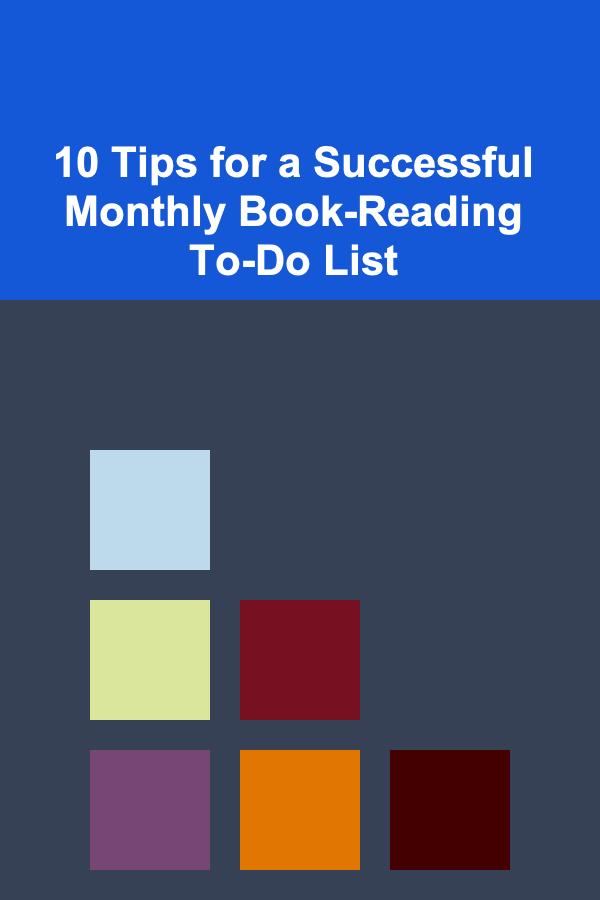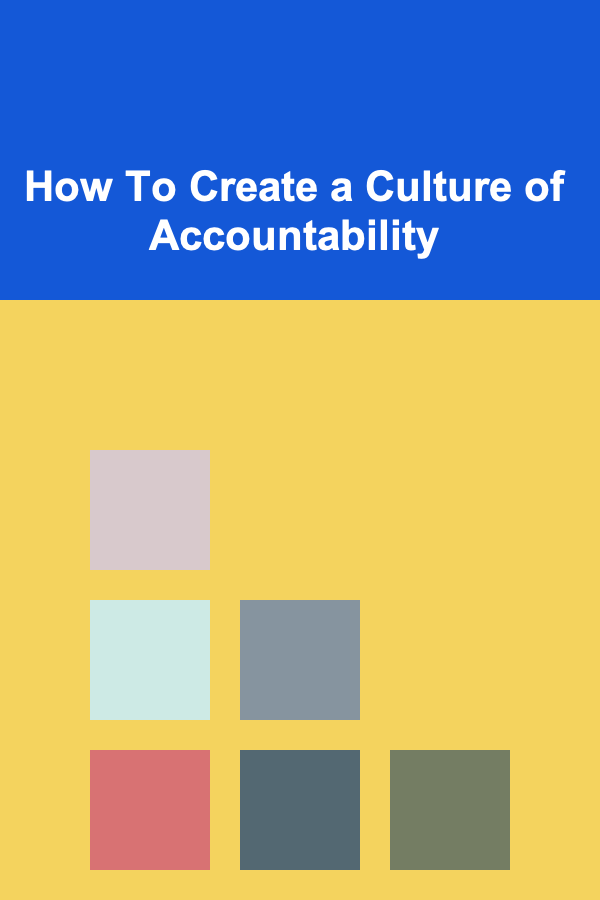
10 Tips for a Successful Monthly Book-Reading To-Do List
ebook include PDF & Audio bundle (Micro Guide)
$12.99$6.99
Limited Time Offer! Order within the next:

Reading is not just a pastime but a way to expand your knowledge, stimulate your creativity, and relax your mind. Many people set reading goals, but sticking to them can be challenging without a clear plan. A monthly book-reading to-do list is an effective way to make sure you're consistently progressing toward your reading goals while enjoying a wide range of books.
In this article, we will explore 10 practical tips that will help you create a successful monthly book-reading to-do list. Whether you're a slow reader, an avid bookworm, or someone looking to integrate more reading into your life, these tips will help guide you through every step.
Set a Realistic Reading Goal
One of the most important aspects of a book-reading to-do list is setting a goal that is both challenging and achievable. It's essential to understand your reading pace and commit to a realistic number of books for the month.
- Assess Your Reading Speed: Different people read at different speeds. Some people can comfortably read a book in a week, while others might take longer. To determine a reasonable goal, estimate how many pages you can read per day, then calculate how many books that translates to in a month.
- Be Flexible: Setting a goal doesn't mean you have to stick to it rigidly. Life happens, and some books might take longer to finish than expected. Allow room for flexibility in your monthly reading goal, especially if you come across more challenging or lengthy books.
By setting a goal that aligns with your schedule and reading habits, you will be more likely to succeed in completing your monthly reading list.
Diversify Your Reading List
Reading the same type of book month after month can become monotonous, so it's important to mix things up. A diverse reading list not only keeps you engaged but also allows you to explore new genres, authors, and ideas.
- Genres: Challenge yourself to read books from different genres, such as fiction, non-fiction, fantasy, mystery, history, and self-improvement. This not only keeps your reading fresh but broadens your intellectual horizons.
- Themes: Read books that cover different themes such as personal development, mental health, society, technology, or cultural studies. This will help you to think critically and engage with the world in new ways.
- Authors from Various Backgrounds: Make it a point to read works by authors from diverse cultural backgrounds. This will not only enhance your perspective but also introduce you to new writing styles and storytelling techniques.
A varied reading list will keep you motivated and excited to turn the page.
Prioritize Books That Spark Your Interest
While it's great to challenge yourself to read a variety of books, it's also important to choose books that genuinely spark your interest. Reading should feel like a pleasure, not a chore. When you're invested in a book, you're more likely to finish it and enjoy the process.
- Follow Your Curiosity: If you find yourself interested in a specific topic---whether it's a historical event, a scientific breakthrough, or a fictional universe---add books on that subject to your list.
- Pay Attention to Recommendations: Don't hesitate to ask friends, family, or colleagues for book recommendations. Often, the best books are those that come from trusted sources.
- Try New Authors: If you've always stuck to the same authors, consider branching out. Trying new authors can help reignite your passion for reading and expose you to fresh writing styles.
When you prioritize books that genuinely intrigue you, the reading experience becomes more enjoyable, making it easier to stay committed to your monthly goal.
Break Your Books into Manageable Chunks
One of the biggest obstacles to completing books is feeling overwhelmed by the length or complexity of the material. Breaking your books into smaller, manageable chunks can make the process more enjoyable and less intimidating.
- Set Daily Reading Goals: Instead of focusing on finishing a book, set a goal for how many pages or chapters you will read each day. For instance, you could aim to read 20 pages a day, and by the end of the week, you'll have read 140 pages.
- Track Progress: Keep a log of your daily reading progress. This helps you stay accountable and allows you to see how far you've come.
Breaking books into smaller sections helps you build a daily reading habit and ensures you make steady progress.
Create a Comfortable Reading Environment
Where you read is just as important as what you read. Having a comfortable, quiet space where you can immerse yourself in the book is crucial for effective reading.
- Designate a Reading Spot: Choose a location where you can relax and concentrate. This could be a cozy corner of your home, a coffee shop, or a peaceful park.
- Minimize Distractions: Turn off notifications on your phone or tablet. If possible, avoid checking social media or email while reading to maintain focus.
- Good Lighting: Ensure your reading space is well-lit, preferably with natural light or a soft, warm lamp, to avoid eye strain.
A comfortable reading environment helps you focus and allows you to get lost in the book, making your monthly reading goal easier to achieve.
Use Audiobooks or E-books When Necessary
Sometimes, it's hard to find time to sit down and physically read a book. In such cases, audiobooks and e-books can be lifesavers, especially when you're on the go or trying to fit in a reading session during your commute or workout.
- Audiobooks: Audiobooks are an excellent way to keep up with your reading list while multitasking. You can listen to them during your commute, while cleaning, or even when exercising.
- E-books: E-books offer the convenience of carrying multiple books on a single device, which is ideal if you travel frequently or have limited space for physical books. Many e-books also come with features like highlighting and note-taking, making it easy to mark important passages.
Using audiobooks and e-books provides flexibility, allowing you to fit more reading into your daily routine.
Track Your Progress and Celebrate Milestones
Tracking your reading progress helps you stay motivated and provides a sense of accomplishment as you work through your list. Recognizing milestones along the way keeps you inspired to reach your next goal.
- Use a Reading Journal: Record the books you've read, along with a short review or a summary of key takeaways. This helps you reflect on what you've learned and gives you a sense of satisfaction.
- Online Platforms: Apps like Goodreads allow you to track your reading goals, rate books, and join challenges with friends. Engaging in a reading community can provide additional motivation.
- Celebrate Your Achievements: When you finish a book or reach a specific milestone (e.g., 5 books read), take a moment to celebrate. Whether it's treating yourself to something special or simply reflecting on your accomplishment, recognizing your success boosts your morale.
Tracking progress and celebrating milestones makes reading feel more rewarding and helps you stay committed to your goal.
Mix Fiction and Non-Fiction
While it's easy to get lost in a world of fictional stories, adding non-fiction to your reading list can provide real-life insights and valuable knowledge. Balancing both genres ensures that your reading experience remains both educational and entertaining.
- Fiction: Fiction allows you to escape into new worlds and explore complex characters and plots. It can stimulate your imagination and help you empathize with people and cultures outside your own.
- Non-Fiction: Non-fiction, on the other hand, offers practical knowledge and insights into various fields such as science, history, or self-development. Reading non-fiction expands your understanding of the world and offers fresh perspectives on issues.
Balancing fiction and non-fiction enriches your reading life, providing both intellectual stimulation and entertainment.
Stay Consistent, But Don't Pressure Yourself
Consistency is key to achieving your reading goals, but it's also essential not to put too much pressure on yourself. Remember, reading should be enjoyable, not stressful.
- Set a Routine: Aim to read at the same time each day---whether it's in the morning, during lunch, or before bed. Consistency builds the habit and makes reading a natural part of your daily routine.
- Be Kind to Yourself: If you miss a day or fall behind on your reading goal, don't stress. Life can get busy, and the important thing is to keep going rather than give up entirely.
Staying consistent while allowing room for flexibility is the secret to successfully completing your monthly reading goals.
Share What You've Learned with Others
Sharing your insights from books with others helps reinforce your learning and keeps you engaged with the material. It also allows you to connect with like-minded people who share your reading interests.
- Join Book Clubs or Discussion Groups: Participating in book clubs or online discussion groups can provide a platform to share ideas and engage in meaningful conversations about what you've read.
- Social Media: Share book reviews or thoughts on social media platforms, or even start a book blog. Discussing your reading experiences can keep you motivated and inspire others to read more.
Sharing your reading experiences not only deepens your understanding but also strengthens your reading community.
Conclusion
Reading regularly can be a transformative experience, offering countless benefits for your mind and well-being. By following these 10 tips, you can create a successful monthly book-reading to-do list that helps you meet your goals, explore new ideas, and enjoy the act of reading itself.
Reading More From Our Other Websites
- [Hiking with Kids Tip 101] Nature Detective: Fun Observation Games to Keep Kids Engaged on the Trail
- [Organization Tip 101] How to Create a Minimalist Entryway for a Welcoming Home
- [Organization Tip 101] How to Use Clear Storage Solutions for Easy Visibility
- [Hiking with Kids Tip 101] From Base to Shell: Essential Clothing Layers Every Young Hiker Needs
- [Whitewater Rafting Tip 101] From Rapids to Campfires: Essential Gear Checklist for Rafting and Camping Trips
- [Organization Tip 101] How to Organize Your Collection Based on Value and Sentiment
- [Home Space Saving 101] How to Save Space in Your Living Room with Modular Furniture
- [Home Budget Decorating 101] How to Find Budget-Friendly Home Decor That Makes a Statement
- [Organization Tip 101] How to Celebrate Milestones with Charity Donations
- [Personal Financial Planning 101] How to Invest in Stocks for Beginners: A Step-by-Step Guide

How To Create a Culture of Accountability
Read More
How to Organize Pet Accessories for Convenience
Read More
How to Sell Homemade Baked Goods and Start a Bakery Business from Home
Read More
How to Deal with Unfamiliar Food Textures and Flavors
Read More
How to Plan a Sustainable and Eco-Friendly Travel Itinerary
Read More
How to Become a Logistics Coordinator Without a Degree
Read MoreOther Products

How To Create a Culture of Accountability
Read More
How to Organize Pet Accessories for Convenience
Read More
How to Sell Homemade Baked Goods and Start a Bakery Business from Home
Read More
How to Deal with Unfamiliar Food Textures and Flavors
Read More
How to Plan a Sustainable and Eco-Friendly Travel Itinerary
Read More